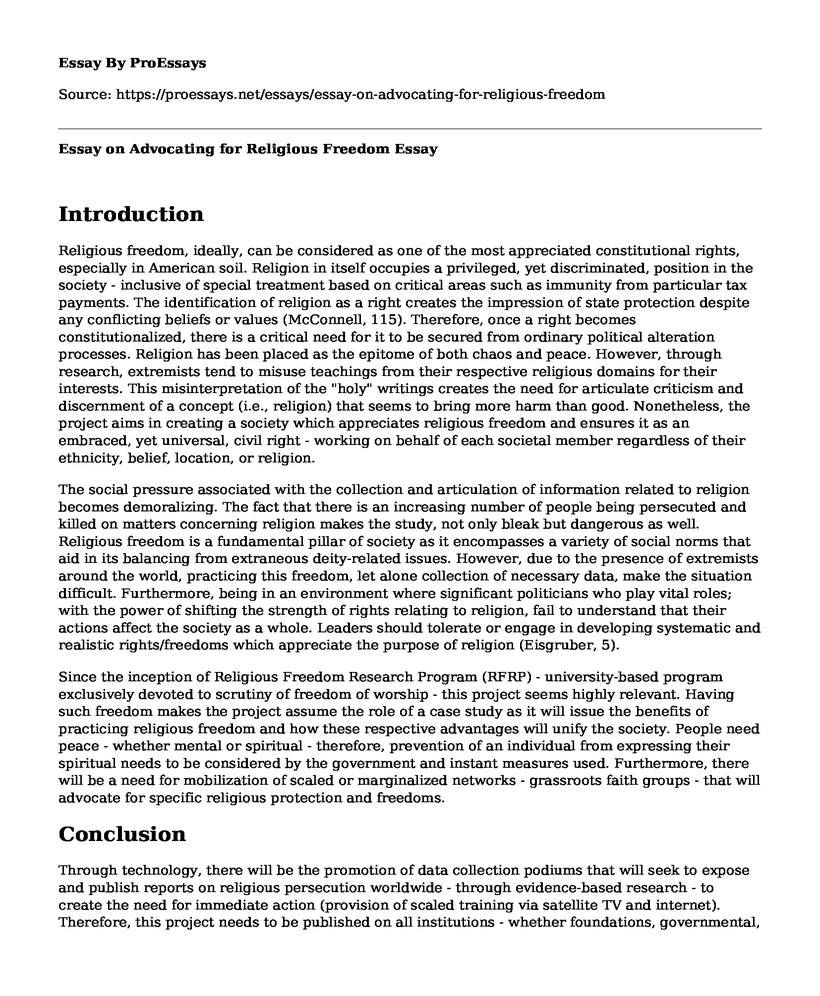Introduction
Religious freedom, ideally, can be considered as one of the most appreciated constitutional rights, especially in American soil. Religion in itself occupies a privileged, yet discriminated, position in the society - inclusive of special treatment based on critical areas such as immunity from particular tax payments. The identification of religion as a right creates the impression of state protection despite any conflicting beliefs or values (McConnell, 115). Therefore, once a right becomes constitutionalized, there is a critical need for it to be secured from ordinary political alteration processes. Religion has been placed as the epitome of both chaos and peace. However, through research, extremists tend to misuse teachings from their respective religious domains for their interests. This misinterpretation of the "holy" writings creates the need for articulate criticism and discernment of a concept (i.e., religion) that seems to bring more harm than good. Nonetheless, the project aims in creating a society which appreciates religious freedom and ensures it as an embraced, yet universal, civil right - working on behalf of each societal member regardless of their ethnicity, belief, location, or religion.
The social pressure associated with the collection and articulation of information related to religion becomes demoralizing. The fact that there is an increasing number of people being persecuted and killed on matters concerning religion makes the study, not only bleak but dangerous as well. Religious freedom is a fundamental pillar of society as it encompasses a variety of social norms that aid in its balancing from extraneous deity-related issues. However, due to the presence of extremists around the world, practicing this freedom, let alone collection of necessary data, make the situation difficult. Furthermore, being in an environment where significant politicians who play vital roles; with the power of shifting the strength of rights relating to religion, fail to understand that their actions affect the society as a whole. Leaders should tolerate or engage in developing systematic and realistic rights/freedoms which appreciate the purpose of religion (Eisgruber, 5).
Since the inception of Religious Freedom Research Program (RFRP) - university-based program exclusively devoted to scrutiny of freedom of worship - this project seems highly relevant. Having such freedom makes the project assume the role of a case study as it will issue the benefits of practicing religious freedom and how these respective advantages will unify the society. People need peace - whether mental or spiritual - therefore, prevention of an individual from expressing their spiritual needs to be considered by the government and instant measures used. Furthermore, there will be a need for mobilization of scaled or marginalized networks - grassroots faith groups - that will advocate for specific religious protection and freedoms.
Conclusion
Through technology, there will be the promotion of data collection podiums that will seek to expose and publish reports on religious persecution worldwide - through evidence-based research - to create the need for immediate action (provision of scaled training via satellite TV and internet). Therefore, this project needs to be published on all institutions - whether foundations, governmental, educational, or communal - that will fight for the freedom of practicing their respective, yet diverse, religious activities anywhere around the world without any form of segregation or persecution. Nonetheless, this project needs to be published on all crucial online platforms - inclusive of countries in religious crisis. There will be a critical need to mobilize large networks, inclusive of established denominations both in the U.S. and abroad. Also, grassroots religious activists need to be part and parcel of this project for the sole purpose of being equipped with the necessary toolkits and relevant action plans advocating for religious freedom.
References
Eisgruber, Christopher L., and Lawrence G. Sager. Religious freedom and the constitution. Harvard University Press, 2009.
McConnell, Michael W. "Religious freedom at a crossroads." The University of Chicago Law Review 59.1 (1992): 115-194.
Cite this page
Essay on Advocating for Religious Freedom. (2022, May 16). Retrieved from https://proessays.net/essays/essay-on-advocating-for-religious-freedom
If you are the original author of this essay and no longer wish to have it published on the ProEssays website, please click below to request its removal:
- Kingdoms and Cultures - Essay Sample on Religion
- What Can Christianity Contribute to Pluralistic Culture? Essay Example
- Experience in Saint Demetrios Greek Orthodox Church Essay
- Old Testament Essay Example
- Essay Sample on Become an Exceptional Gospel Singer: Combining Impeccable Vocals & Stirring Lyrics
- 3 Wisdom Subjects I Learned From Class Attendance - Essay Sample
- Michael Luther King Jr - Essay Sample







